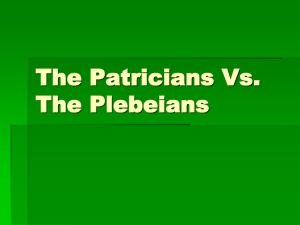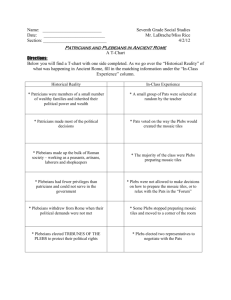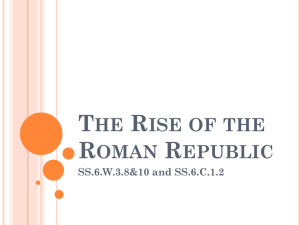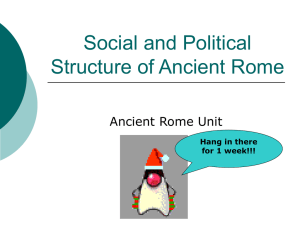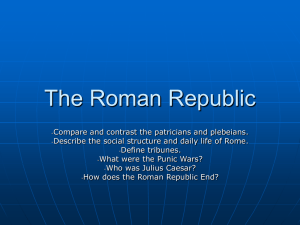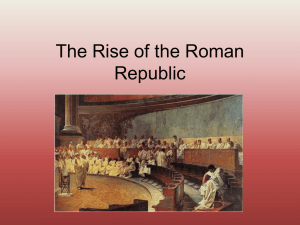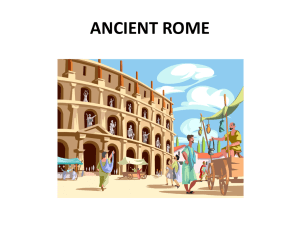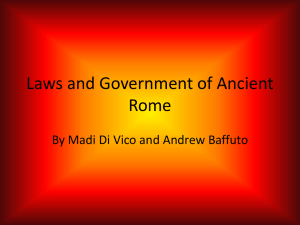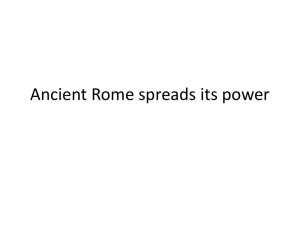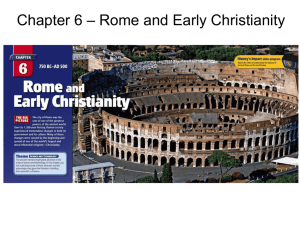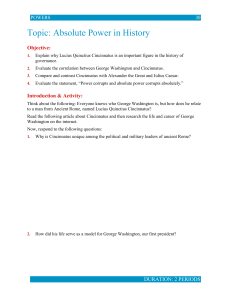File
advertisement
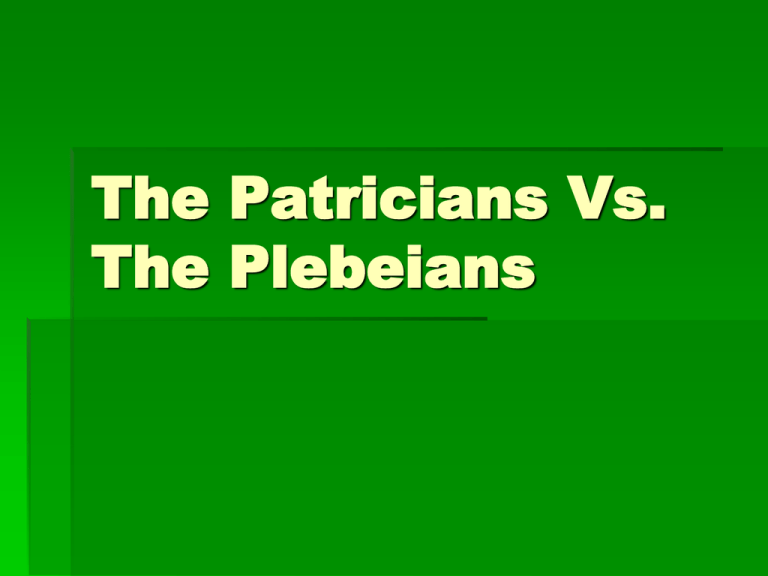
The Patricians Vs. The Plebeians Patricians Referred to as the elite or rich families in ancient Rome. They took over after kings were kicked out in 509 B.C. The upper class Dominated the Senate and Republic. Ruled unjustly, treated Plebeians unfairly Lived within Rome, fortified Plebeians The working/ poor class of Rome. Farmers, metal workers, artisans, and merchants. Lived in the countryside People from other conquered cities Dependent on the Patricians In debt after wars Had voting power but no control of the Republic. Held no office. Not fairly represented. Struggle of the Orders A Struggle for economic & political rights. The Plebeians wanted a change in the government. They wanted more say. The Patricians held all the power in the Republic and were the only ones allowed to hold office. 4 main grievances Power of the Patricians Poverty Law of debt = Slavery Unequal division of public land Power of the Patricians The Pats and the Plebs both worked to kick out kings but Pats reaped all the benefits. Could vote but cant hold office. The power of Rome rested in the upper class only. Power exercised in a harsh and selfish manner 1st struggle between the rich and poor Poverty & The Unjust law of Debt Poverty Unjust law of Debt Wars left the Plebs dependent and poor Not protected by city walls, during war time. Out fighting for country while home is destroyed. Poor when they come back. Having lost everything because of war they now need to borrow money. If they couldn’t pay off the debt you could be arrested, thrown into a dungeon, and made a slave to that person. Was meant to keep the poor class poor. Unequal division of land Land acquired after wars that should have been divided up among the people. Instead the Pats shared it between themselves. The longer patricians controlled the land, the more they would look upon it as their own property Patricians and Plebeians Two groups of Rome that struggled for power! Lets battle in a Debate! 37 Class Struggle 11/18 Is it fair that some people are rich and others are poor? Why? The Struggle of the Orders Could not take the injustices so they revolted Throwing down their weapons and abandoning the army. In 494 B.C. the Plebeians revolt and form their own council & elected officials. Struggle of the Orders This frightened many of the Patricians because they thought Rome would fall apart if the 2 groups couldn’t work together. Patricians knew if people stayed unhappy, they might rise up and overthrow the whole government. Changes in the Government To calm the angry Plebeians, the Patricians made some changes in the government. The law of debt had been revoked and anyone imprisoned was released. Most important effect was the creation of a new office, tribunes. Tribunes = Protect Plebeians rights. Only could be held by a Plebeian. Had the power to veto. Twelve Tables Before the 12 tables the laws were not written down, laws were interpreted by the Patricians. How would this have been a disadvantage for Plebeians? 450 B.C. ten officials began writing down Rome’s laws. Became a basis for Roman law. Developed the idea that all free citizens had a right to the protection of the law. 494 BCE: traditional date of the First Secession of the Plebs, during which they established their own assembly and elected their own magistrates and the Tribunes 450 BCE: traditional date of the Law of the Twelve Tables, the first codification of Roman law 445 BCE: patricians and plebeians were permitted to intermarry 367 BCE: plebeians became eligible for the consulship 342 BCE: law passed making it mandatory that one of the two Consuls must be a plebeian ****Over time the distinction between Pleb & Pat disappeared but it took a very long time. **** Challenges Outside of Rome Shortly after Rome becomes a Republic, war breaks out. Over 200 years of fighting. In 387 the Gauls attack Rome and takes over the city. Romans pay them a huge amount of money to leave. After this other neighbors try the same thing. Rome won most of the wars but it took a toll on the Romans. Many places were destroyed and many people died. A Dictator is Chosen. During difficult wars, the Romans chose a dictator to replace the 2 consuls. A dictator is a ruler with absolute power. The dictator lead the city, but could only be in power for 6 months. Why do you think during tough wars did Rome have a dictator? Cincinnatus Cincinnatus was one of early Rome’s most famous dictator. Cincinnatus was originally a farmer, but was asked to defend the city against a powerful enemy. Once he won the war, he immediately resigned as dictator and returned to his farm. Even before his 6 month term ended. Fighting did not end with Cincinnatus. Rome continued to fight with their neighbors for many years. What are some reasons that Cincinnatus would be honored so highly in Rome? Cincinnatus 519 B.C. - ? Cincinnatus is the most famous dictator from the early Roman Republic. Because he wasn’t eager to hold on to his power, the Romans considered Cincinnatus an ideal leader. They admired his abilities and his loyalty to the republic. The early citizens of the United States admired the same qualities in their leaders. In fact, some people called George Washington the “American Cincinnatus” when he refused to run for a third term as president. The people of the state of Ohio also honored Cincinnatus by naming one of their major cities, Cincinnati, after him.
